| Lot |
Photo |
Description |
Lot 1014 |
 |
Amherst, Jeffery, Baron (1717-1797), British General during the French and Indian War, captured Montreal (1760) ending French control of Canada, Governor-General of British North America (1761-1763), commander-in-chief of the army (1778), refused field command during Revolutionary War for personal reasons. Autograph Letter Signed, "Amherst", one page, 7¼ x 9, Montreal, April 14, 1789. Amherst writes to Lord Sydney [Thomas Townshend] acknowledging receipt of a letter concerning the health of the King and the States of the Island of Guernsey. Very Fine condition with integral blank leaf laminated to a backing sheet.
Estimate 500 - 750
View details and enlarged photo
|
Lot 1015 |
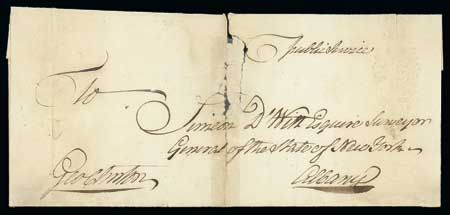 |
Clinton, George (1739-1812), New York soldier and politician, member of the Continental Congress (1775-1776) but called to active service before signing the Declaration of Independence, first Governor of New York (1777-1795), U.S. Vice-President under Jefferson and Madison (1805-1812). Free-franked cover as governor, folded address leaf addressed in his hand to Simeon DeWitt, Surveyor General of New York, boldly endorsed "Geo Clinton" and "Public Service", docketed on reverse "Warrant for 40,000 acres in favor of Jellis Fonda, 20. July 1785". Separated in half vertically (not affecting signature) and taped together, otherwise Fine.
Estimate 300 - 400
View details and enlarged photo
|
Lot 1016 |
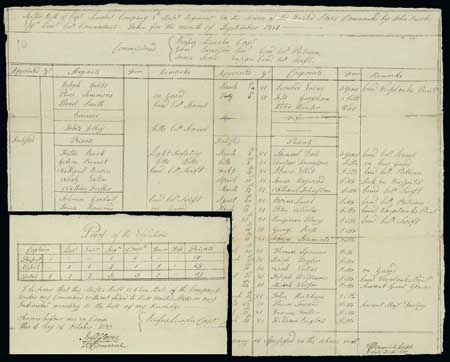 |
Glover, John (1732-1797), soldier, Brigadier General of the Continental Army (1777-1782). Revolutionary War Dated Manuscript Document Signed "Jn. Glover/B. General", one and one-third pages, 16¾ x 13¼ Camp (West Point or Peekshill), October 6, 1781. "Muster Roll of Capt. Lincoln's Company of 7th Mass. Regiment in the Service of the United States Commanded by John Brooks Elgr. Lieut. Colo. Commandant— Taken for the month of September 1781," also signed by "Rufus Lincoln Capt." Folded in six parts, reinforced splitting along folds, Fine overall state of preservation.
Estimate 2,000 - 3,000
John Glover was the first Regimental Commander of the 14th Continental Infantry from January 1, 1776 (prior to that it had been the Marblehead Militia Regiment)- February 21, 1777, after which he was promoted to Brigadier General. Glover was instrumental in overseeing the evacuation from Long Island on August 29, 1776, fought at Pell's Point on October 18, and his regiment ferried Washington and his troops across the Delaware on Christmas night. His men then fought at the Battle of Trenton on January 14, 1777. Later responsibilities included escorting General Burgoyne and 5,800 prisoners to Boston, as well as an active role in the trial and execution of Major John André at West Point.
View details and enlarged photo
|
Lot 1017 |
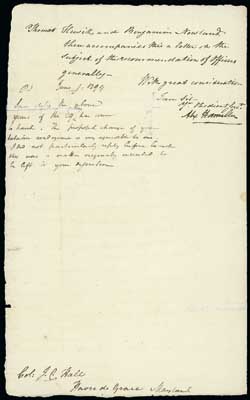 |
Hamilton, Alexander (1755-1804), West Indies-born lawyer and politician, Secretary and aide-de-camp to George Washington, 1st Secretary of the Treasury (1789-1795), co-wrote The Federalist Papers with James Madison and John Jay, killed in a duel by Aaron Burr. Letter Signed, 1½ pages [two sides off same sheet], New York, May 31, 1799. To "Col: J.C. Hall, Havre de Grace, Maryland", mentions the appointment of a Quarter Master, the selection of a Regimental Rendezvous point and
"…I trust that by this time tents, and Camp Utensils as well as cloathing [sic] have been received. The disposition of the cloathing as to the place of deposit is referred to your discretion
"The Act of receiving an advance of money by any officer will determine his acceptance of his commission — But every officer who has not before done it ought to signify that acceptance to the Secretary of War. Delay in doing it has been inconsiderate. The law is to govern in regard to the compensation of two Dollars allowed to the recruiting officers.
"I have seconded your recommendations to the Secretary of War of Thomas Hewitt and Benjamin Nowland. There accompanies this a letter on the subject of recommendations of officers generally [not present] —
"With great consideration I am Sir Y.r Obedient Serv.t Alex Hamilton"
He then adds a post script dated June 1, in part "The proposed change of yor batalion [sic] rendezvous is very agreeable to me. I did not particularly reply before because this was a matter originaly [sic] intended to be left to your discretion"
Taped repair of vertical and horizontal splits along folds, otherwise Fine.
Estimate 10,000 - 15,000
EXCELLENT CONTENT FOR A HAMILTON LETTER REGARDING THIS LITTLE-KNOWN "WAR".
This letter was written while Hamilton served in the capacity of organizer and de facto commander of a national army during the "Quasi-War" with France (1798-1800) which took place entirely at sea. The army was intended to conquer the North American colonies of France’s ally, Spain, if war were to be formally declared; this conflict is also referred to as "The Undeclared War with France".
View details and enlarged photo
|
Lot 1018 |
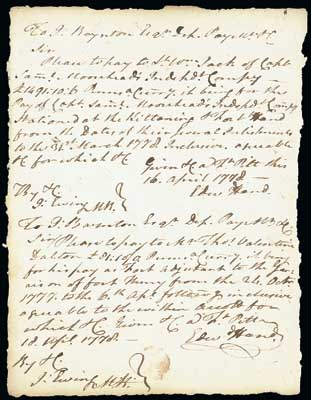 |
Hand, Edward (1744-1802), Physician, Revolutionary War officer, Adjutant General to George Washington (1781), Pennsylvania delegate to the Confederation Congress (1783-1784), signer of the Pennsylvania Constitution (1790). Revolutionary War Dated Manuscript Document, not signed, two pages (both sides of one sheet), 6¼ x 8¼ Fort Pitt [Pittsburgh, Pa.], April 16 & 18, 1778. Each side bearing two different Pay Vouchers written to a "J. Boynton, Dep. Pay M.r &c.", the first to Capt. James O’Hara "…for the pay of his Compy. of Regulars stationed at Fort Pitt…", the second is for Daniel Newman "…for his pay as Surgeon to the Garrison of Fort Pitt…", the third is for the "…pay of Capt. Saml. Moorehead’s Indepe.t Compy. stationed at the Kittaning & Fort Hand…" and the fourth for Thomas Valentine "…for his pay as Fort Adjutant to the Garrison of Fort Henry…"; amounts are express in "Penns.a Curry.", each with proxy signature of "Edwd Hand" as Commanding Officer at Fort Pitt, "By &c. J: [Jasper] Ewing, M.R." Very Fine condition.
Estimate 750 - 1,000
A MOST INTERESTING WARTIME DOCUMENT GIVING AN INDICATION OF MILITARY PAY SCALES.
View details and enlarged photo
|
Lot 1019 |
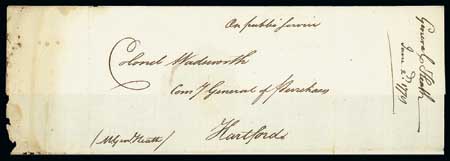 |
Heath, William (1737-1814), U.S. Major General in the Revolutionary War, later a Massachusetts state senator and probate court judge. Revolutionary War Dated Manuscript Letter Signed, 1½ pages, 7¼ x 8¾ Head Quarters, Boston, June 2, 1778, bold signature "W Heath MG", with integral address leaf in another hand to Col. Wadsworth, Commissary General of Purchases at Hartford, endorsed in the same hand "On Public Service" and "(M. Genl. Heath)", interesting letter concerning past-due Officers’ rations, Fine condition.
Estimate 750 - 1,000
View details and enlarged photo
|
Lot 1020 |
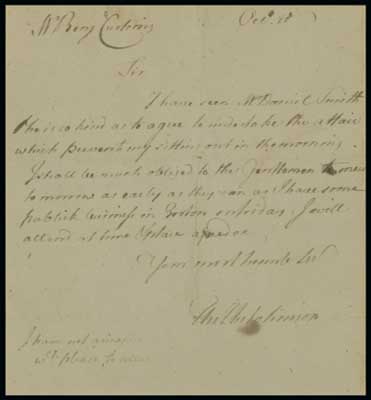 |
Hutchinson, Thomas (1711-1780), Colonial Governor of Massachusetts (1771-1774), Autograph Letter Signed, one page, 6¼ x 7, no place, October 20, no year. To Benjamin Cushing about arranging to meet. Very Fine, small age spot below signature. With non-contemporary engraving in ornate frame 15½ x 13¼.
Estimate 400 - 500
As acting Governor of Massachusetts in 1770, Hutchinson was obliged to order the removal of British soldiers following the Boston Massacre after strong public pressure. He was an ardent and outspoken Loyalist, who left Massachusetts for England in 1774 and had his property confiscated.
Cushing was co-owner of the brig "Providence" which had been seized by the English ship "Beaver" in 1772 for evading import duties. The other British ship patrolling the waters was the "Gaspee", whose officer had been fired upon with what was euphemistically known as the first American action against the British.
View details and enlarged photo
|
Lot 1021 |
 |
Jay, John (1745-1829), Jurist, politician, diplomat, President of Continental Congress (1778-1779), first Chief Justice of the U.S. Supreme Court (1789-1795), Governor of New York (1795-1801). Co-authored, with Alexander Hamilton and James Madison, "The Federalist Papers", a series of 85 articles written in 1787-1788, which are still a primary source for interpretation of the U.S. Constitution. Printed Document Signed, one page, 7 x 11½ no place, no date. "In Congress Wednesday. April 3, 1776. Instructions to the Commanders of Private Ships or Vessels of War, which shall have Commissions or Letters of Marque and Reprisal, authorising them to make Captures of British Vessels and Cargoes." with eleven separate paragraphs detailing procedures to be followed. Signed at the bottom next to the printed word "President". Repaired upper left corner not affecting text, slightly reduced with minor splits at the ends of horizontal folds, Fine.
Estimate 2,500 - 3,000
There is no way to know exactly when Jay signed this copy. He may have done so at the time the law was passed, or when he was elected to the Presidency of Congress, December 10, 1778 (as the law was still in effect), or at any time between.
View details and enlarged photo
|
Lot 1022 |
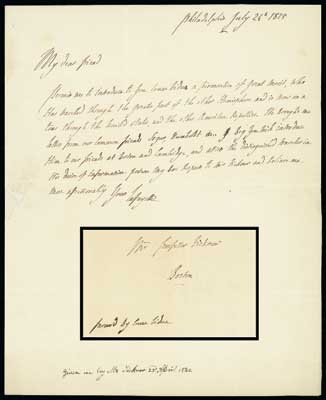 |
Lafayette, Marquis de (1757-1834), French nobleman, soldier and adventurer, joined the Continental forces as a Major General at the age of 20, in 1779 returned to France to solicit French aid for his new nation, after the War worked with U.S. Ambassadors to France, Franklin and then Jefferson, on behalf of America's interests. Autograph Letter Signed, "Lafayette", one page, 7¾ x 9½ Philadelphia, July 24, 1825. Letter of introduction of a Count Vidua [?] to Professor [George] Ticknor in Boston, in part "…who has travelled through the greater part of the other Hemisphere and is now on a tour through the United States, and the other American Republics. He brought me letters from our common friends Segur, Humboldt, etc. I beg you will introduce him to our friends at Boston and Cambridge and assist the distinguished traveller in his desire of information…", integral address leaf in his own hand "Mr. Professor Ticknor, Boston" and "favoured by Count Vidua" (hand carried); neatly repaired hole about 1½" x ¾" on fold, mostly on address leaf, Very Fine appearance.
Estimate 1,000 - 1,500
George Ticknor (1791-1871) was an American educator, author and European scholar. In 1817 he became Smith professor of French and Spanish languages and literatures and professor of belles-lettres at Harvard. He resigned the chair in 1836 and was succeeded by Henry Wadsworth Longfellow.
View details and enlarged photo
|
Lot 1023 |
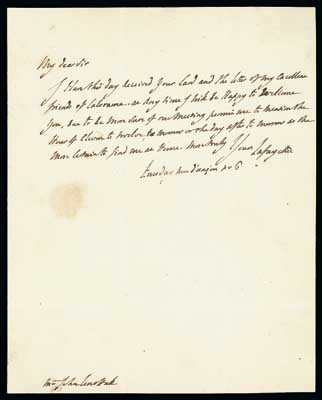 |
LaFayette, Marie-Joseph Paul Yves Roche Gilbert du Motier, Marquis de (1757-1834), French nobleman, soldier and adventurer, joined the Continental forces as a Major General at the age of 20, in 1779 returned to France to solicit French aid for his new nation, after the War he worked with U.S. Ambassadors to France, Franklin, and then Jefferson, on behalf of America's interests. Autograph Letter Signed "Lafayette", one page (with blank integral leaf), 6¼ x 7¾ Rue d'Anjou number 6 (Paris?), December 18, 1832. To John Lentfak in Paris, confirming request to call upon Lafayette, also mentions receiving a letter from "my excellent friends of Calorama" (home of Colonel George Bomford, who introduced bomb cannons or "columbiads" during the War of 1812), where LaFayette had spent an evening in 1824. With integral address leaf in LaFayette's hand, Paris date stamp of December 19, 1832, wax seal complete but small patched area at edge where letter opened and small sealed tear just into address panel.
Very Fine.
Estimate 1,000 - 1,500
View details and enlarged photo
|
Lot 1024 |
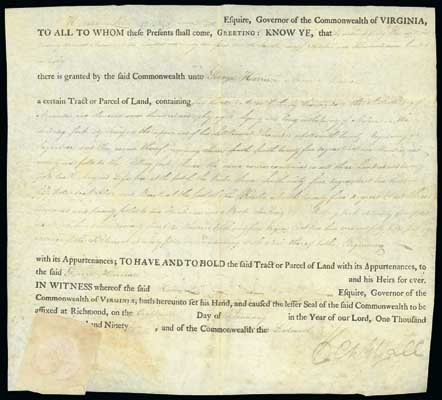 |
Lee, Henry ["Light Horse Harry"] (1756-1818), Officer in the Continental Army and politician, delegate to Continental Congress from Virginia (1786-1788), Governor of Virginia (1791-1794), U.S. Representative from Virginia (1799-1801). Eulogized George Washington as "First in war, first in peace, and first in the hearts of his countrymen." Document Signed as governor of Virginia, one page, 13½ x 12, Richmond, January 18, 1792. Land Grant on vellum, to one George Harrison "Assignee of John Moore" (Harrison’s name has been contemoraneously penned in where Moore’s had been erased). Folded in eighths and in Fine condition with bold Lee signature, though the ink is just a bit faded.
Estimate 300 - 400
View details and enlarged photo
|
Lot 1025 |
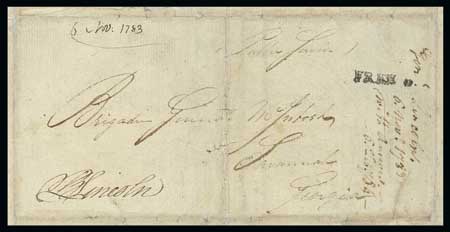 |
Lincoln, Benjamin (1733-1810), U.S. Revolutionary War General, First Secretary of War (1781-1783) under the Articles of Confederation. Free franked address leaf, November 6, 1783, "B Lincoln" and, in another hand, "Public Service", addressed in that same hand to General Lochlan McIntosh in Savannah, Ga., manuscript "6 - Nov: 1783" with handstamped "Free", docketed at right; silked on verso and inlaid to an overall 13¼ x 11¼ with some repaired internal breaks, none of which affect the bold signature, Fine appearance.
Estimate 1,000 - 1,500
McIntosh, the man who killed Button Gwinnett in a duel, was a close friend and compatriot of Lincoln. The two were captured and taken prisoner by the British when Charleston fell in May of 1780. Later, after a prisoner exchange, Lincoln played a major role in Cornwallis‘ defeat at Yorktown. Humiliated by his defeat, Cornwallis refused to personally surrender his sword to Washington and instead sent his second in Command, General Charles O'Hara. Washington, in response, sent Lincoln to accept Cornwallis' sword. This letter was written a month after Lincoln had resigned his position as Secretary of War and shortly before he retired from active military service.
View details and enlarged photo
|
Lot 1026 |
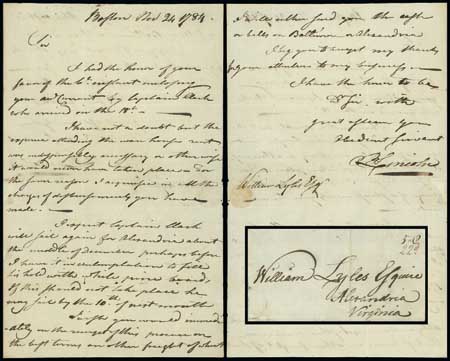 |
Lincoln, Benjamin (1733-1810), U.S. Revolutionary War General, First Secretary of War (1781-1783) under the Articles of Confederation. Autograph Letter Signed, "B Lincoln", 1½ pages, 7¾ x 12¾ Boston, November 24, 1784. Business letter to William Lyles in Alexandria, Va. who is apparently handling Lincoln’s business affairs, in part
"…I expect Captain Clark will sail again for Alexandria about the middle of December perhaps before. I have it in contemplation to fill his hold with white pine boards. If this should not take place he may sail by the 10.th of next month. I wish you would immediately upon receipt of this procure on the best terms another freight of wheat. I will find you either the cash or bills on Baltimore or Alexandria…".
Integral address leaf in Lincoln’s hand with manuscript "5 - 8/ 22.d" rate. Professionally repaired splits along fold and tear at lower right, laminated in mylar. Fine appearance.
Estimate 1,000 - 1,500
View details and enlarged photo
|
Lot 1027 |
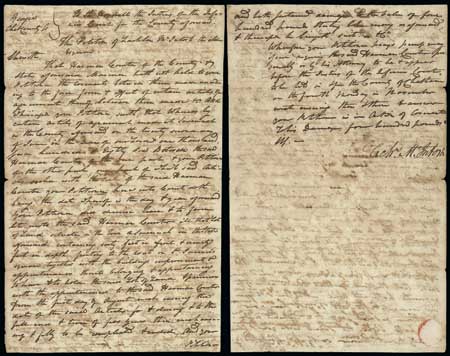 |
McIntosh, Lachlan (1725-1806), Surveyor, soldier from Georgia, protégé of Oglethorpe, Brigadier General with Washington at Valley Forge. In 1777 became embroiled in a dispute with Button Gwinnett over command of Georgia's forces. Gwinnett, who thought command should be his, challenged McIntosh to a duel. Both men were wounded, Gwinnett mortally. Manuscript Document Signed, 3½ pages, 7½ x 12¼ Chatham County, Ga., no date. Ruling by the Inferior Court of Chatham County in favor of McIntosh, the petitioner, in a suit against one Harman Courter for not properly maintaining rented, in the sum of "four hundred pounds thirty like money…" The date of the original agreement between McIntosh and Courter is cited as June 22, 1786. Some browning and minor splitting of folds, still Fine with a bold McIntosh signature.
Estimate 500 - 750
View details and enlarged photo
|
Lot 1028 |
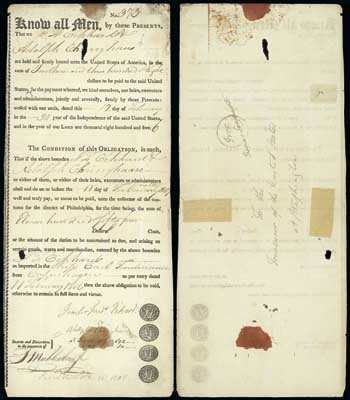 |
Muhlenberg, John Peter Gabriel (1746-1807), Virginia clergyman, General in Continental Army, after war Vice-President of Pennsylvania under Franklin, U.S. Congressman and Senator from Pennsylvania. Document Signed, one page, 5½ x 12½ Philadelphia, February 12, 1806. Partly-printed acknowledgement of import duties due on the cargo of the "Ship Carl Ferdinand from Copenhagen", boldly signed "P Muhlenberg" as Philadelphia Customs Collector. Verso is an address leaf to the U.S Treasury in Washington and bears a handstamped circle with manuscript "Free, Thomas Sergeant". Fine condition with two small internal holes.
Estimate 500 - 750
View details and enlarged photo
|
Lot 1029 |
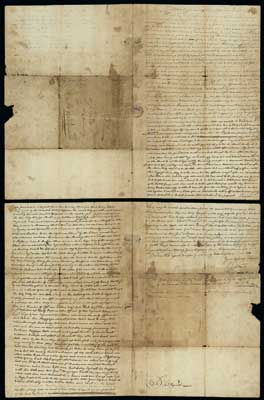 |

Reid, George (1733-1815), Revolutionary War soldier from New Hampshire. War-date Autograph Letter Signed, 2½ pages with integral address leaf (no postal markings), 9 x 13¾ "Mojes [?] Creek about 5 miles below Fort Edward [N.Y.]", July 22, 1777, written as Lt. Colonel of the 2nd N.H. Regiment, to his brother-in-law, Jonathan Nesmith in Londonderry, N.H. In a small, very readable script Reid has penned a detailed account of the American retreat from Ticonderoga and Mt. Independence which began only about 2½ weeks before this letter was written. In part (spelling corrected and punctuation added):
"You have no doubt heard of our unexpected retreat from Ticonderoga and Mount Independence…I can't or won't pretend to say perhaps it was for the best to evacuate both places, there was tis’ true, a very formidable fleet & land Army approaching us and [they] were making Batteries on all Quarters especially levell’d against Ty [Ticonderoga] that in all probability we could not lived on that side any time, whether or not we might have stood a seige some time on the Mount Im not alone to determine. Their force its true was far superior to ours, their Mettle [sic] heavier & their strength by sea or water very considerable."
He then gives details of abandoning Ticonderoga, crossing and cutting the bridge between Ticonderoga and Mount Independence, then being shelled by the British as they were leaving "the Mount". He adds further details of the retreat, of Col. [Ebenezer] Francis’ rejection of British Genl. [Simon] Frazer’s offer of terms for surrender, of various skirmishes on the way to Hubbardton and of his being shot and rescued, etc. He gives names of the officers captured, tells of how their baggage was sent ahead by boat but was captured, and how Col. [Joseph] Cilley, for safety’s sake, had put his son aboard a boat with the baggage. Regarding the latter Reid writes "…Colo. Cilley lost all his baggage with his young son but Genl. Burgoyne treated his son very kindly while with him and has sent him home into our camp with a flag". Finally, Reid talks of their current camp where "Genl. Nixon’s Brigade is arrived to our assistance"and "…we hear Genl. [John] Sullivan is on his way to join us"and "…Genl. [Benedict] Arnold arrived here yesterday, for what purpose I can’t yet tell…" Condition is Fine but with multiple tape repairs along split folds.
Estimate 1,000 - 1,500
A FASCINATING AND IMPORTANT HISTORICAL ACCOUNT.
With the capture of Col. Nathan Hale [no relation] at the Battle of Hubbardton by the British Army, Lt. Col. George Reid took command of the 2nd N.H. Regiment and led them during the rest of the Saratoga Campaign, the Battle of Monmouth and the Sullivan Expedition of 1779. He was eventually promoted to the rank of Brigadier General.
View details and enlarged photo
|
Lot 1030 |
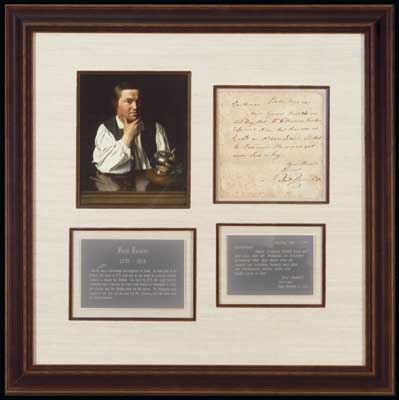 |
Revere, Paul (1735-1818), Boston silversmith, printer and patriot, instrumental in the Boston Tea Party, rode to Lexington to warn Hancock and Adams that British troops in Boston were preparing to move. Revolutionary War Dated Autograph Letter Signed, one page, 6 x 6, Boston, May 1, 1779. To an unnamed recipient, in full:
"Boston, May 1 1779
Gentlemen
Major General Heath told me this Day, that Mr. Williams on Noddles informed Him: that there was no Guard on Noddles Island; and that the Ordinance Stores were not under Lock of key.
Your Humble
Servant
Paul Revere Lt Col."
Fine condition with light all-over foxing. Handsomely matted and framed to an overall 23 x 23 with a color portrait of Revere and two steel-engraved plaques, on a short Revere biography, the other a transcription of the letter.
Estimate 30,000 - 40,000
AN EXCEEDINGLY RARE WAR RELATED LETTER BY REVERE IN FULL HOLOGRAPH.
According to our records, this is the only example of a Revolutionary War Dated Letter written by Paul Revere which has ever been offered at a major public auction.
View details and enlarged photo
|
Lot 1031 |
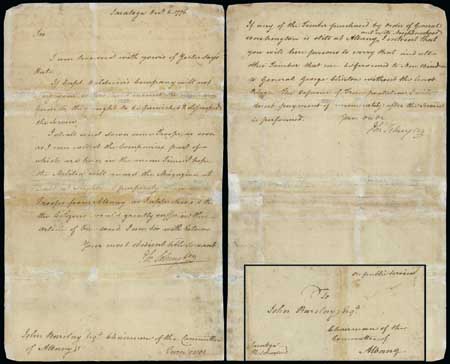 |
Schuyler, Phillip John (1733-1804), New York soldier and politician, member of the Continental Congress (1775, 1779-1780), Major General in the Revolutionary War, U.S. Senator (1789-1791, 1797-1798), daughter Elizabeth was the wife of Alexander Hamilton. Revolutionary War Dated Free-franked cover and Autograph Letter Signed, "Ph: Schuyler", 1½ pages (one sheet) plus integral address leaf (separated), 7¾ x 12¾ Saratoga, N.Y., December 6, 1776. To John Barclay, Chairman of the Committee of Albany, Schuyler writes, in part "If Capt. Baldwin's Company will not obey your orders and mount the necessary guards, they ought to be punished & dismissed the service…" He then mentions collecting troops and guarding the Magazine at Albany and that he "…purposely drew all the troops from Albany, as I apprehend that the Citizens would greatly suffer in the article of fire wood."
At the bottom of the page Schuyler has written "Turn over" and on the reverse has added a post script, in part "If any of the Timber purchased by order of General Washington is still in Albany and within its neighborhood, I entreat that you will hire persons to carry that and all other Timber that can be procured to New Windsor to General George Clinton without the least delay…"
Both sides are signed and the address leaf, in Schuyler’s hand, is endorsed "on public service" and "Saratoga - - Ph: Schuyler". Archival tape repairs along folds and edges with few small edge pieces missing.
Estimate 5,000 - 7,500
THE ONLY RECORDED FRANKED COVER OF PHILLIP SCHUYLER — HIS AUTOGRAPH LETTERS ARE QUITE SCARCE IN THEIR OWN RIGHT.
View details and enlarged photo
|
Lot 1032 |
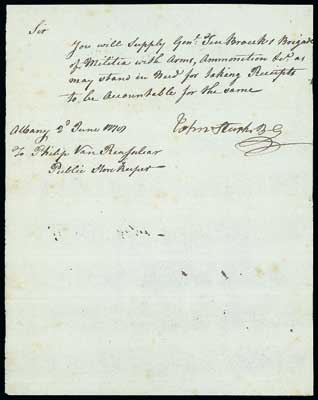 |
Stark, John (1728-1822), American Revolutionary War General from New Hampshire, hero at Bunker Hill and "Hero of Bennington". Revolutionary War Dated Autograph Letter Signed, one page, 7¼ x 9¼ Albany, June 2, 1779. To Philip Van Rensselaer, Public Store Keeper: "Sir, You will Supply Genl. TenBrouk’s Brigade of Militia with Arms, Ammonition [sic] &ct: as may stand in need for taking Receipts to be accountable for the same." Choice signature "John Stark, BG", docketed on verso, Very Fine.
Estimate 4,000 - 6,000
AN EXCEPTIONAL WAR DATE DOCUMENT FROM NEW HAMPSHIRE’S GREATEST HERO.
Expertization: PSA/DNA Letter of Authenticity.
Passed over for promotion to General, Stark resigned his Continental Army commission in March of 1777. Four months later, he was offered a commission as Brigadier General of the New Hampshire Militia. He accepted on the condition that he would not be answerable to Continental Army authority. Soon afterward he was ordered by Brigadier General Philip Schuyler to depart from Charlestown, New Hampshire to reinforce the Continental Army at Saratoga, N.Y. He refused and instead led his men to meet the Hessians at the Battle of Bennington. Before engaging the Hessian troops, Stark prepared his men to fight to the death, shouting, "There are your enemies…They are ours, or this night Molly Stark sleeps a widow!" In 1809 he was invited to a reunion of Bennington veterans. He replied in a letter that he was not well enough to travel and closed with the words, "Live free or die. Death is not the worst of evils." In 1945 "Live free or die" became the New Hampshire state motto.
View details and enlarged photo
|
Lot 1033 |
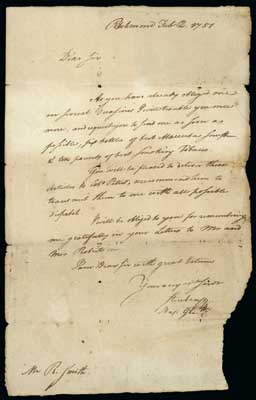 |
Steuben, Friedrich Wilhelm Augustus, Baron von (1730-1794), U.S. Revolutionary War General, Inspector General in charge of training the Continental Army. Wardated Manuscript Letter Signed, "Steuben, Maj: Genl:", one page, 8¼ x 13, Richmond, February 2, 1781, to Robert Smith, a Philadelphia merchant, Steuben writes requesting "…six bottles of best Manuba Snuff & ten pounds of best Smoking Tobacco… for his troops shortly after the Benedict Arnold-led British attack on Richmond; integral address leaf (soiled) with manuscript "3-8" rate but no other postal markings. Browned with edge tears and irregular piece missing from lower right corner (not affecting text), Very Good and quite rare.
Estimate 4,000 - 6,000
Steuben joined the Army at Valley Forge carrying letters of recommendation from Franklin and Silas Deane, who had been told that "von" Steuben had served as Aide-de-Camp and Quartermaster General to Frederick the Great. Despite the fact that he was later revealed to be merely a soldier of fortune who had never held a rank higher than captain and who had himself added the "von" to his name, he became a key figure in the success of the American revolution.
View details and enlarged photo
|
Lot 1034 |
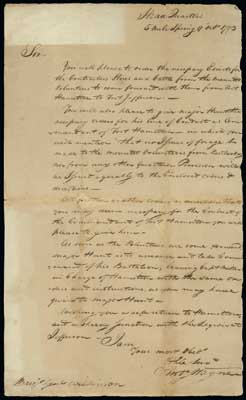 |
Wayne, Anthony ["Mad Anthony"] (1745-1796), U.S. General in the Revolutionary War and in the Northwest Indian War (1793-1795), U.S. Representative from Georgia (1791-1792). Autograph Letter Signed, "Anty Wayne", one page, 8¼ x 13½ Head Quarters, 5 Mile Spring [near Cincinnati], October 9, 1793. Wayne writes to "Brigr. Genl. Wilkinson" giving orders to escort "Contractors’ Stores and Cattle" from Fort Hamilton to Fort Jefferson and gives orders for provisioning and commanding troops, mentioning specifically a Maj. Hunt and a Capt. Miller, and "the Legion", which was the newly formed Legion of the United States. A bit of uneven browning and minor splitting at folds, one of which passes through the "A" of the signature. An excellent war-related document from the Fallen Timbers Campaign.
Estimate 2,000 - 2,500
View details and enlarged photo
|
Lot 1035 |
 |

1775 New Jersey Militia Commission, partly-printed form, 13¼ x 8, October 24, 1775, commissioning one "Doctor Ebenezer Elmer" a "Third Lieutenant of a Company of Light Infantry in the Second Battalion of Foot Militia in the county of Cumberland which Jonathan Elmer Esqr. [Ebenezer’s brother] is Captain…", signed boldly by Samuel Tucker as president of "The Deputies of the Several Counties of New-Jersey in Provincial Congress". Fine condition with reinforced splitting along some folds.
Estimate 500 - 750
Elmer was a New Jersey physician and politician, a U.S. Representative from N.J. (1801-07) and the last N.J. survivor of the Society of Cincinnati. His brother Jonathan was a delegate to the Continental Congress and a U.S. Senator (1789-91).
View details and enlarged photo
|
Lot 1036 |
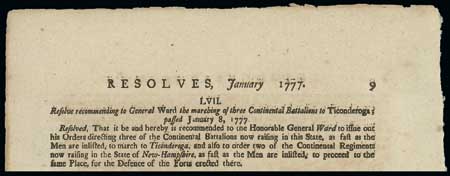 |

1777 Resolved of the State of Massachusetts, Printed Documents, six pages, 8 x 13¾ January 8, 14-20, 1777. Various Resolutions adopted including recommendation to General Ward to have three Continental Battalions march to Ticonderoga, various defenses, procurement of supplies, etc., usual browning. Fine.
Estimate 200 - 300
View details and enlarged photo
|
|